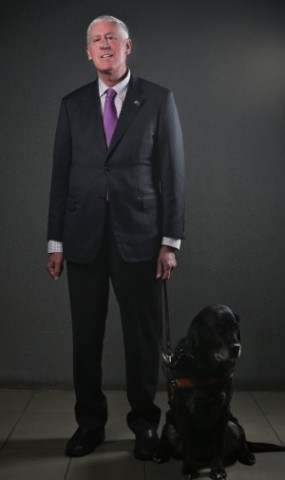
Julia May, 7/2/2015
The Federal Government's cuts to the disability sector are a "catastrophic" blow and breach the United Nations convention on the rights of disabled people, advocacy groups and one of the architects of the convention says.
The Department of Social Services announced yesterday it would fund an alliance of six groups representing disabled people by demographic rather than specific need. This threatens eight peak bodies with 200,000 members with intellectual disabilities – autism, brain injuries and physical disabilities including blindness and deafness.
The Assistant Social Services Minister, Mitch Fifield, said up to $3.6 million would be allocated over two years to the National Cross-Disability Alliance, comprising representatives of disabled children, women, Indigenous people, ethnic minorities and service providers. This is a 40 per cent cut on the previous funding arrangement that spanned three years rather than two. Mr Fifield said the alliance would be the primary source of grass-roots advice on issues of national policy advice for people with disability.
Graeme Innes is the former federal disability commissioner, who co-authored the UN Convention on the Rights of Persons with Disabilities, to which Australia is a signatory. Legally blind, he said the move breaches Article 33 of the convention. "If you don't adequately resource the national peak organisations to represent the voices [of disabled people] you effectively stop that voice and therefore, can't monitor and implement the convention," he said. "We have chosen the organisations who we want to speak for us. It's inappropriate for the government to make a unilateral decision not to fund these disability groups."
The cuts form part of a $240 million departmental savings drive. Dr Stone said they will further inhibit intellectually disabled people from shaping the design of the National Disability Insurance Scheme, which campaigners say is already fatally flawed due to a lack of consultation. Intellectually disabled people will represent two-thirds of future users of the scheme, but have not been formally consulted on its design.Inclusion Australia, the peak body for intellectually disabled people, was among those to lose funding. Its president, Kevin Stone, said the cuts have "silenced the collective voice of people with intellectual disability – those most in need of representation at the highest level given their historical marginalisation".
But Craig Wallace, president of People With Disabilities Australia, which received funding, said the alliance represents a "modern, coherent and more comprehensive national voice for people with disability. This means that people with any kind of disability can directly join, elect and hold accountable the peaks who represent them to Government".
Robbi Williams, chief executive of disability policy research agency JFA Purple Orange, gave warning that some defunded peak bodies, which have decades of experience representing people with complex and specific needs, could fold within weeks, and that their work cannot be replicated by other organisations. "It is unrealistic to assume other funded agencies will somehow be able to routinely pick up this momentum," he said. "The decision is catastrophic because it undermines the diverse voices within the disability community at a time when those voices need to be heard the most."